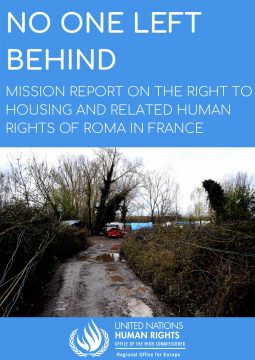 The UN Human Rights Regional Office for Europe today published “No One Left Behind: Mission Report on the Right to Adequate Housing and Related Rights of Roma in France”. France counts some 570 slums, inhabited by circa 16,000 persons. Roma from Romania and Bulgaria reportedly make up the majority of persons living in slums.
The UN Human Rights Regional Office for Europe today published “No One Left Behind: Mission Report on the Right to Adequate Housing and Related Rights of Roma in France”. France counts some 570 slums, inhabited by circa 16,000 persons. Roma from Romania and Bulgaria reportedly make up the majority of persons living in slums.
In January 2018, France reinvigorated its policy to eradicate informal slums or squats (“bidonvilles”). The Office of the United Nations High Commissioner for Human Rights (OHCHR) undertook a mission to France from 25 to 29 March 2018 to gain an in-depth understanding of the progress, challenges and opportunities in the enjoyment of the right to adequate housing and related rights by Roma, particularly in light of the new policy and recommendations issued to France by international human rights bodies and mechanisms. The team visited Paris and Île-de-France, Marseille and Toulouse where it interviewed a broad range of stakeholders.
On the occasion of the launch of the “No One Left Behind” report, Regional Representative for Europe Birgit Van Hout said, “While progress has been made, France is yet to fully implement the recommendations of the UN on the right to adequate housing, which is a fundamental human right. The substandard housing conditions of slum dwellers our team witnessed, combined with repeated forced evictions and segregated housing arrangements, contribute to a cycle of marginalization and precariousness that heightens the stigma attached to being Roma.”
Extensive evictions of Roma have been carried out in France in recent years, with over 10,000 persons reportedly evicted every year since 2014. A number of persons have been evicted multiple times. A surge of evictions of Roma took place immediately before the 2017-2018 winter moratorium and continued throughout the winter moratorium.
“The right to adequate housing is a lever for the realization of many other human rights and therefore warrants special attention,” said Van Hout, “forced evictions without sustainable alternatives disrupt the schooling of children and jeopardise the right to education.” It is estimated that forced evictions in practice cost, on average, six months in the schooling of every child.
The Instruction of January 2018 holds the potential for human rights-friendly policies – since it recognizes that past practices of forced evictions did not work, and that a stronger engagement is needed to ensure the sustainable exit of persons from informal slums toward accessing their rights. The UN Human Rights Office report therefore calls for the strengthening of political will and action at all levels across the country and highlights that more resources are needed.
Human Rights Officer Claude Cahn said, “The cycle of slum housing coupled with periodic forced eviction should be replaced by inclusion in mainstream, integrated housing with appropriate support. The opportunity created by the new Instruction should be seized to conceive and implement policies that protect and promote the human rights of the most excluded, so that no one is left behind.”
For further information on the “No One Left Behind” report, please contact Tomas Goldstein:
tomasgoldstein.consultant@ohchr.org
English: https://europe.ohchr.org/Documents/Publications/NO%20ONE%20LEFT%20BEHIND%20ENG.pdf
French: https://europe.ohchr.org/Documents/Publications/FinalFROnline.pdf


